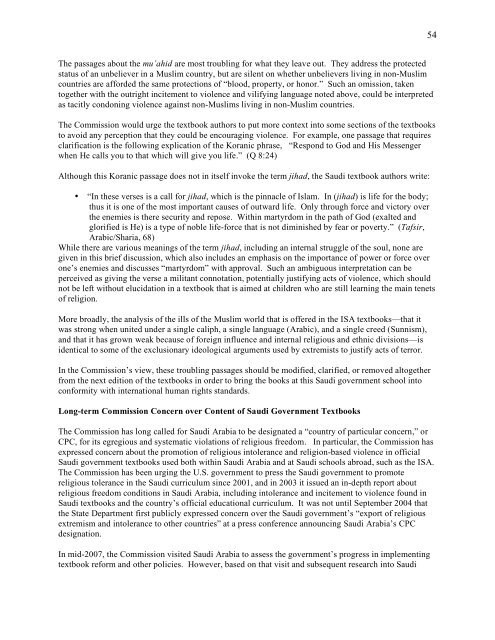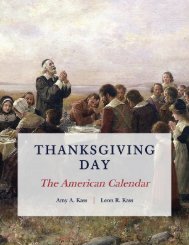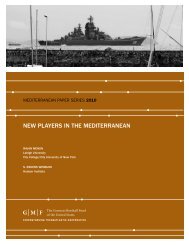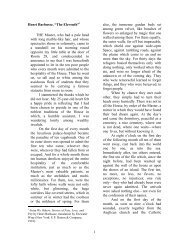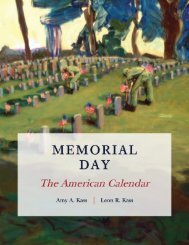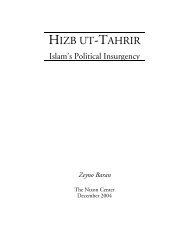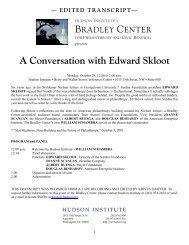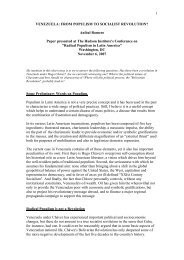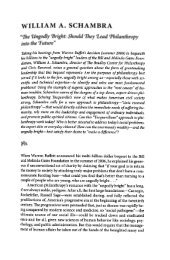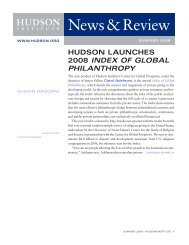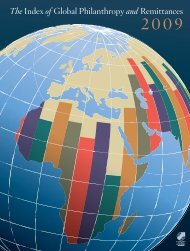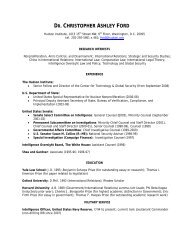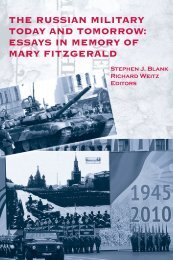Saudi Arabia's Curriculum of Intolerance - Hudson Institute
Saudi Arabia's Curriculum of Intolerance - Hudson Institute
Saudi Arabia's Curriculum of Intolerance - Hudson Institute
Create successful ePaper yourself
Turn your PDF publications into a flip-book with our unique Google optimized e-Paper software.
54<br />
The passages about the mu’ahid are most troubling for what they leave out. They address the protected<br />
status <strong>of</strong> an unbeliever in a Muslim country, but are silent on whether unbelievers living in non-Muslim<br />
countries are afforded the same protections <strong>of</strong> “blood, property, or honor.” Such an omission, taken<br />
together with the outright incitement to violence and vilifying language noted above, could be interpreted<br />
as tacitly condoning violence against non-Muslims living in non-Muslim countries.<br />
The Commission would urge the textbook authors to put more context into some sections <strong>of</strong> the textbooks<br />
to avoid any perception that they could be encouraging violence. For example, one passage that requires<br />
clarification is the following explication <strong>of</strong> the Koranic phrase, “Respond to God and His Messenger<br />
when He calls you to that which will give you life.” (Q 8:24)<br />
Although this Koranic passage does not in itself invoke the term jihad, the <strong>Saudi</strong> textbook authors write:<br />
• “In these verses is a call for jihad, which is the pinnacle <strong>of</strong> Islam. In (jihad) is life for the body;<br />
thus it is one <strong>of</strong> the most important causes <strong>of</strong> outward life. Only through force and victory over<br />
the enemies is there security and repose. Within martyrdom in the path <strong>of</strong> God (exalted and<br />
glorified is He) is a type <strong>of</strong> noble life-force that is not diminished by fear or poverty.” (Tafsir,<br />
Arabic/Sharia, 68)<br />
While there are various meanings <strong>of</strong> the term jihad, including an internal struggle <strong>of</strong> the soul, none are<br />
given in this brief discussion, which also includes an emphasis on the importance <strong>of</strong> power or force over<br />
one’s enemies and discusses “martyrdom” with approval. Such an ambiguous interpretation can be<br />
perceived as giving the verse a militant connotation, potentially justifying acts <strong>of</strong> violence, which should<br />
not be left without elucidation in a textbook that is aimed at children who are still learning the main tenets<br />
<strong>of</strong> religion.<br />
More broadly, the analysis <strong>of</strong> the ills <strong>of</strong> the Muslim world that is <strong>of</strong>fered in the ISA textbooks—that it<br />
was strong when united under a single caliph, a single language (Arabic), and a single creed (Sunnism),<br />
and that it has grown weak because <strong>of</strong> foreign influence and internal religious and ethnic divisions—is<br />
identical to some <strong>of</strong> the exclusionary ideological arguments used by extremists to justify acts <strong>of</strong> terror.<br />
In the Commission’s view, these troubling passages should be modified, clarified, or removed altogether<br />
from the next edition <strong>of</strong> the textbooks in order to bring the books at this <strong>Saudi</strong> government school into<br />
conformity with international human rights standards.<br />
Long-term Commission Concern over Content <strong>of</strong> <strong>Saudi</strong> Government Textbooks<br />
The Commission has long called for <strong>Saudi</strong> Arabia to be designated a “country <strong>of</strong> particular concern,” or<br />
CPC, for its egregious and systematic violations <strong>of</strong> religious freedom. In particular, the Commission has<br />
expressed concern about the promotion <strong>of</strong> religious intolerance and religion-based violence in <strong>of</strong>ficial<br />
<strong>Saudi</strong> government textbooks used both within <strong>Saudi</strong> Arabia and at <strong>Saudi</strong> schools abroad, such as the ISA.<br />
The Commission has been urging the U.S. government to press the <strong>Saudi</strong> government to promote<br />
religious tolerance in the <strong>Saudi</strong> curriculum since 2001, and in 2003 it issued an in-depth report about<br />
religious freedom conditions in <strong>Saudi</strong> Arabia, including intolerance and incitement to violence found in<br />
<strong>Saudi</strong> textbooks and the country’s <strong>of</strong>ficial educational curriculum. It was not until September 2004 that<br />
the State Department first publicly expressed concern over the <strong>Saudi</strong> government’s “export <strong>of</strong> religious<br />
extremism and intolerance to other countries” at a press conference announcing <strong>Saudi</strong> Arabia’s CPC<br />
designation.<br />
In mid-2007, the Commission visited <strong>Saudi</strong> Arabia to assess the government’s progress in implementing<br />
textbook reform and other policies. However, based on that visit and subsequent research into <strong>Saudi</strong>


